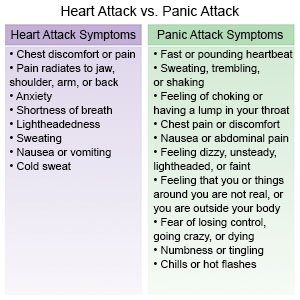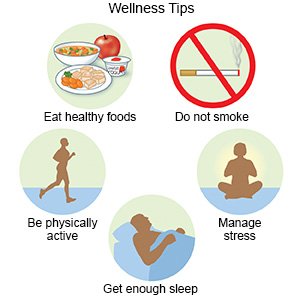Panic Attack
Medically reviewed by Drugs.com. Last updated on May 6, 2024.
What is a panic attack?
A panic attack is a strong feeling of fear or discomfort. The attack starts suddenly, is worst 10 minutes after it starts, and stops within 20 minutes. An attack may be triggered by something you do, such as public speaking. Exposure to something you are afraid of can also trigger an attack. A panic attack can also happen for no clear reason. Panic attacks that happen often may be a sign of a panic disorder that needs long-term treatment.
What are the signs and symptoms of a panic attack?
- Chest pain or discomfort, or fast or irregular heartbeats
- Sweating, trembling, lightheartedness, or fainting
- Hyperventilation (breathing so quickly you become dizzy, lightheaded, or faint)
- Shortness of breath, trouble breathing, or a feeling that you are choking or smothering
- Pale or cold skin, chills, or hot flashes
- Nausea, vomiting, or abdominal pain
- A feeling that you are separate from your body
 |
How is a panic attack diagnosed and treated?
Your healthcare provider will ask what triggered the attack. Tell your provider if fear of another panic attack limits your daily activities. Also tell your provider about any medications you currently take. Tests may be done to check for medical conditions that may be causing your symptoms. Treatment may include any of the following:
- Medicines may be given to make you feel more relaxed or to reduce anxiety that causes a panic attack. Some medicines are taken only when you are having a panic attack. Other medicines can be taken to prevent panic attacks.
- A behavior therapist can help you learn to control how your body responds to stressful situations. The therapist may also teach you ways to relax your muscles and slow your breathing during a panic attack.
- Exposure therapy is used to help you change your reaction to triggers. You are exposed to your panic attack triggers in small amounts. The amount of exposure is slowly increased until it no longer triggers a panic attack.
What can I do to manage or prevent a panic attack?
- Manage stress. Stress can trigger a panic attack. Ways to lower your stress level include yoga, meditation, and talking to someone about the stress in your life.
- Exercise as directed. Exercise can reduce stress and help you sleep better. Try to get at least 30 minutes of physical activity on most days of the week. Your healthcare provider can help you create an exercise plan.
- Set a sleep schedule. Too little sleep can increase anxiety. Go to bed at the same time each night and wake up at the same time each morning. Keep your room quiet and free from distractions, such as a television or computer.
- Eat a variety of healthy foods. Healthy foods include fruits, vegetables, low-fat dairy products, lean meats, fish, and beans. Limit sugar. Sugar can increase your symptoms.
- Do not have foods or drinks that contain caffeine. These include coffee, tea, soda, energy drinks, and chocolate. Caffeine can make anxiety worse or trigger a panic attack.
- Limit alcohol. You may think alcohol makes you calmer, but it is not a safe or effective way to control anxiety. Alcohol can increase anxiety if you drink large amounts or drink often. Ask your healthcare provider how much alcohol is okay for you to drink. A drink of alcohol is 12 ounces of beer, 5 ounces of wine, or 1½ ounces of liquor.
- Do not smoke. Nicotine and other chemicals in cigarettes and cigars can increase anxiety. Ask your healthcare provider for information if you currently smoke and need help to quit. E-cigarettes or smokeless tobacco still contain nicotine. Talk to your healthcare provider before you use these products.
 |
Treatment options
The following list of medications are related to or used in the treatment of this condition.
Call your local emergency number (911 in the US) if:
- You have any of the following signs of a heart attack:
- Squeezing, pressure, or pain in your chest
- You may also have any of the following:
- Discomfort or pain in your back, neck, jaw, stomach, or arm
- Shortness of breath
- Nausea or vomiting
- Lightheadedness or a sudden cold sweat
When should I call my doctor or therapist?
- You have new or worsening panic attacks after treatment.
- You have questions or concerns about your condition or care.
Care Agreement
You have the right to help plan your care. Learn about your health condition and how it may be treated. Discuss treatment options with your healthcare providers to decide what care you want to receive. You always have the right to refuse treatment. The above information is an educational aid only. It is not intended as medical advice for individual conditions or treatments. Talk to your doctor, nurse or pharmacist before following any medical regimen to see if it is safe and effective for you.© Copyright Merative 2024 Information is for End User's use only and may not be sold, redistributed or otherwise used for commercial purposes.
Learn more about Panic Attack
Treatment options
Care guides
Medicine.com guides (external)
Further information
Always consult your healthcare provider to ensure the information displayed on this page applies to your personal circumstances.
